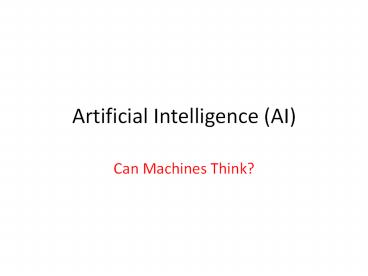Artificial%20Intelligence%20(AI) - PowerPoint PPT Presentation
Title:
Artificial%20Intelligence%20(AI)
Description:
Artificial Intelligence (AI) ... Etc Practical applications of AI Knowledge bases Expert systems AI techniques Heuristics Pattern recognition Machine learning ... – PowerPoint PPT presentation
Number of Views:234
Avg rating:3.0/5.0
Title: Artificial%20Intelligence%20(AI)
1
Artificial Intelligence (AI)
- Can Machines Think?
2
Advantage computer
- Calculate
- Communicate
- Process information
- Storage and recall of facts
- Make decisions using established rules of logic
- Consistency
3
Advantage human
- Perceive
- Reason
- Not all possibilities can be anticipated, and
therefore programmed - Recognize patterns
- Unless a specific pattern has been anticipated
and programmed, a computer cant act on it - Ambiguity
- Application of knowledge (child describing his
toys)
4
So, can they think??
- The Turing Test
- Developed by Alan Turing (1950)
- A person sits at a computer and types questions
into a terminal. - If a computer were truly intelligent, the
questioner would not be able to determine whether
the responder was a human or a computer - To date, no computer has even come close
- Some still consider the Turing Test to be the
best determinant of AI. Other researchers favor
a more lenient definition.
5
Defining AI
- Hard to define
- Many disagree
- ability to perceive, reason, and act
- do things which, at the moment, people are
better - etc
6
Was Deep Blue intelligent?
- Deep Blue was a computer developed by IBM that
defeated Kasparov in chess. - Rules were clearly defined
- Objectives were unmistakable
- Searching Winning typically goes to the player
who can sift through the greatest number of
possibilities and outcomes - Recall Pattern recognition of board patterns and
best strategies to employ given a specific
pattern - Humans may have the edge here
- 25 chess programs can defeat the greatest
players in the world
7
Language Translation
- Still work to be done
- Shakespeare The spirit is willing, but the
flesh is rotten - Computer The wine is agreeable, but the meat
is rotten - Out of sight, out of mind
- Computer Invisible idiot
8
Syntax vs Semantics
- Language rarely limits itself to a consistent set
of rules and structure - There are always exceptions
- Sometimes, understanding the true, underlying
meaning of a single word can require a great deal
of knowledge - Syntax the rules of a language, definitions
of words - Semantics the underlying meanings
- Expressions
- Idioms
- Slang
- Visual cues
- Ambiguity e.g. All that glitters is not gold.
- Etc
9
Practical applications of AI
- Knowledge bases
- Expert systems
10
AI techniques
- Heuristics
- Pattern recognition
- Machine learning
11
Knowledge vs Facts
- Facts are details that are typically quantifiable
and reproducible - Knowledge is the ability to form relationships by
using facts - Humans are considerably better at inferring
things - Computer require tremendous input of data to
accomplish this same task, and even then, will
inevitably fall short at some point
12
Knowledge Base
- A computer KB will
- Incorporate a database of facts
- Incorporate a series of programmed rules
- Attempt to derive new facts by applying steps 1
and 2
13
Expert Systems
- A software program designed to replicate the
decision making process of a human expert - A collection of specialized knowledge where facts
and appropriate actions are obtained from expert
sources and programmed into a database - Usually involves a series of If?Then question
and answers.
14
Algorithms
- An expert system will frequently use a series of
algorithms to provide solutions to a given
question - Here are a couple of examples of well-established
medical algorithms
15
Difficult Airway Algorithm
16
ACLS Algorithm Cardiac Arrest
17
Pulmonary HTN Algorithm
18
Fuzzy Logic
- Uncertainty is an inevitable part of the human
experience - Computers do not handle ambiguity well
- Computers use likelihood (e.g. percentages)
derived from as much factual data as possible
to come up with the best solution
19
Expert Systems - examples
- Training
- Teaching difficult airway procedure to
anesthesiology residents - What do you do next?
- Routine / repetitive task work
- Monitoring millions of credit card accounts for
unusual activity - Expertise when human help is not available
- PDAs with medical databases
- Error reduction
- Checking for drug interactions in an EMR
20
(No Transcript)































